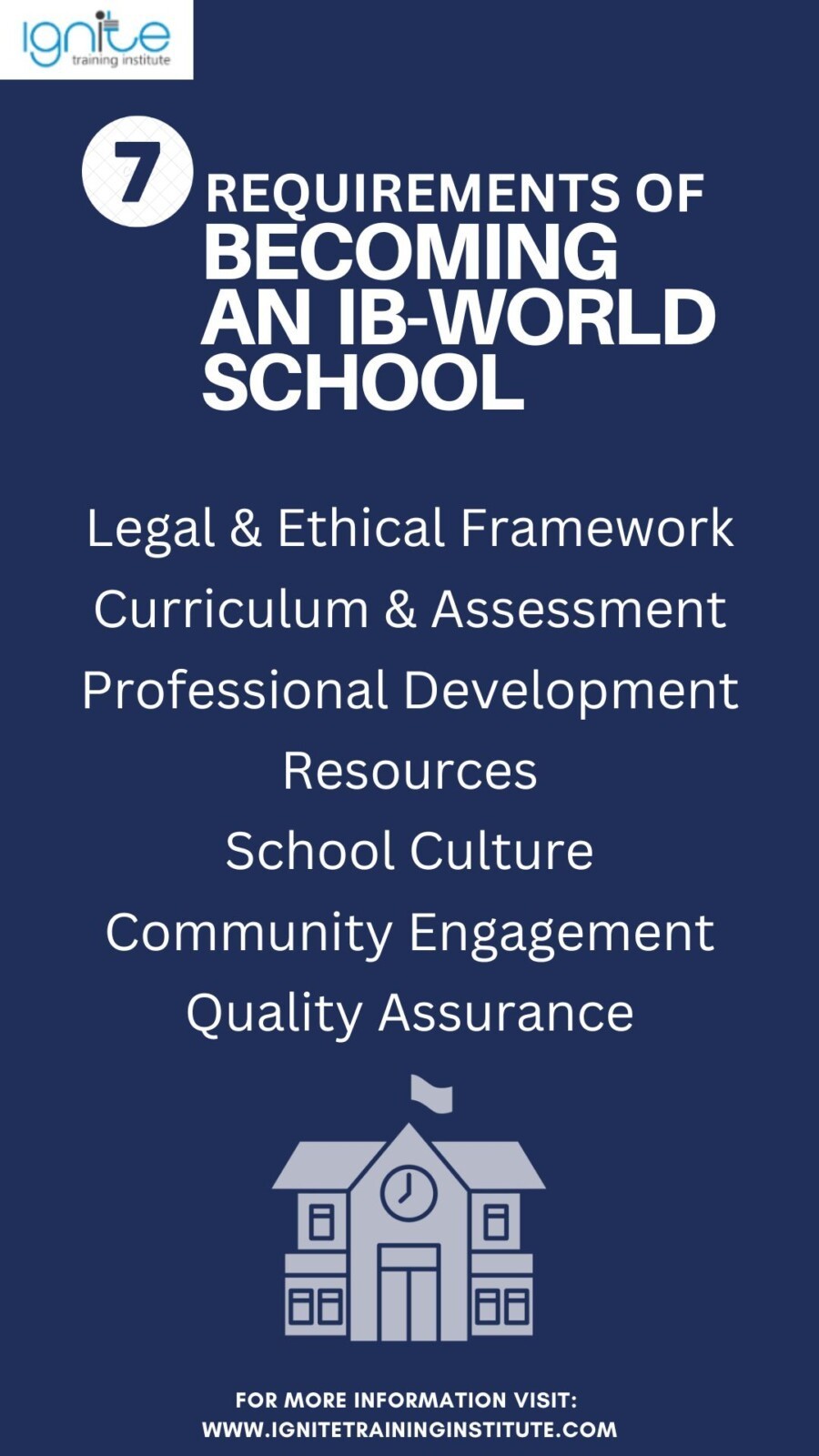The International Baccalaureate (IB) is an educational program that was founded in 1968 with the aim of providing a globally recognized, rigorous, and comprehensive curriculum for students aged 3-19 years. Today, IB World Schools can be found in over 150 countries and offer a wide range of programs including the Primary Years Programme, Middle Years Programme, Diploma Programme, and Career-Related Programme.
The IB curriculum focuses on developing critical thinking, creativity, and problem-solving skills while fostering a strong sense of global citizenship. In this blog, we will explore the features of IB World Schools and the benefits they offer to students, teachers, and the wider community.
Furthermore, Ignite Training Institute offers full educational support for IB Curriculum. Connect with our expert consultants today!
What Is An IB World School?
An IB (International Baccalaureate) World School is an educational institution that has been authorized by the International Baccalaureate Organization (IBO) to offer one or more of the four IB programmes – Primary Years Programme, Middle Years Programme, Diploma Programme, and Career-Related Programme.
IB World Schools are committed to providing a challenging and comprehensive educational experience that emphasizes international-mindedness, inquiry-based learning, and the development of critical thinking skills. They strive to create a learning environment that fosters their students’ personal, social, and academic growth.
To become an IB World School, a school must meet specific requirements and undergo a rigorous authorization process that includes an evaluation of the school’s curriculum, teaching methodology, assessment practices, and administrative policies. Once authorized, IB World Schools are expected to adhere to the IBO’s standards and practices, undergo regular evaluations, and participate in ongoing professional development.
The History Of The IB World School
The International Baccalaureate (IB) programme was founded in 1968 by a group of educators at the International School of Geneva, Switzerland. The founders sought to create a comprehensive and rigorous educational programme that would prepare students for success in a rapidly changing world. The first IB Diploma Programme was offered in 1969, and the programme quickly gained popularity among international schools around the world.
Over the years, the IB programme has evolved and expanded to include a range of programmes that cater to students from primary school through to high school. These curricula encompass the PYP, MYP, DP, and CP.
Today, the IB is a non-profit organization based in Geneva, Switzerland, with offices in New York, Cardiff, and Singapore. The IB works with more than 7,000 schools in over 150 countries, and its programmes are recognized and respected by leading universities and educational institutions around the world.
The IB Curriculum Framework: The 4 Programmes
The IB Curriculum Framework consists of four programmes designed to provide a comprehensive education for students from primary school through to high school.
- The Primary Years Programme (PYP) is for students aged 3-12 and emphasizes inquiry-based learning and developing critical thinking skills. It is organized around six transdisciplinary themes.
- The Middle Years Programme (MYP) is for students aged 11-16 and focuses on interdisciplinary instruction and the development of intellectual, personal, and social skills. It is organized around eight subject groups and areas of interaction.
- The Diploma Programme (DP) is for students aged 16-19 and is a comprehensive pre-university programme that includes six subject groups and core elements that develop critical thinking and other skills.
- The Career-related Programme (CP) is for students aged 16-19 and offers an academic and practical education that is tailored to students’ career interests and goals.
The Learners Profile For IB Students
The IB Learner Profile describes the attributes and characteristics that the IB aims to develop in its students. The Learner Profile is designed to support the IB’s mission of creating a better and more peaceful world through education. The ten attributes of the Learner Profile are:
- Inquirers: Students are curious and eager to learn. They nurture their innate inquisitiveness and gain the abilities essential for performing investigation and research.
- Knowledgeable: Students investigate concepts, ideas, and concerns that hold importance at both local and global levels. They attain extensive knowledge and foster comprehension across a diverse and well-rounded spectrum of academic subjects.
- Thinkers: Students take initiative in utilizing critical and creative thinking skills to identify and address intricate issues, and arrive at informed decisions.
- Communicators: Students possess the ability to confidently and innovatively articulate ideas and information in multiple languages and through various communication methods.
- Principled: Students exhibit honesty and integrity, embodying a robust sense of impartiality, equity, and esteem for the worth of individuals, groups, and communities.
- Open-minded: Students comprehend and value their own cultural heritage and personal histories, while also being receptive to the viewpoints, principles, and customs of other individuals and communities.
- Caring: Students exhibit empathy, kindness, and reverence for the sentiments and necessities of others. They possess a personal dedication to serving and strive to have a beneficial impact on the lives of individuals and the environment.
- Risk-Takers: Students demonstrate bravery and foresight when confronting new or unfamiliar situations, and possess the self-reliance to investigate novel roles, concepts, and approaches.
- Balanced: Students comprehend that attaining personal well-being for themselves and others requires them to strive for a harmonious balance between their intellectual, physical, and emotional aspects.
- Reflective: Students engage in reflective thinking about their learning and experiences, enabling them to evaluate and comprehend their strengths and weaknesses, and thereby promote their personal growth and academic progress.
Requirements For Becoming An IB World School
To become an IB World School, a school must meet certain requirements and follow a rigorous authorization process. The requirements include:

- Legal & Ethical Framework: The school must meet all legal and ethical requirements of the country or region in which it operates.
- Curriculum & Assessment: The school must adopt and implement the IB curriculum and assessment framework for the relevant programme(s) it wishes to offer.
- Professional Development: The school must provide ongoing professional development for its teachers to support the implementation of the IB programme(s).
- Resources: The school must provide the necessary resources, facilities, and equipment to support the implementation of the IB programme(s).
- School Culture: The school must promote a culture of international-mindedness, inquiry-based learning, and student-centred education that aligns with the IB philosophy.
- Community Engagement: The school must actively engage with parents, students, and the wider community to promote the IB philosophy and programmes.
- Quality Assurance: The school must demonstrate a commitment to ongoing quality assurance and improvement, including regular evaluation and reporting.
Related: 2023 Review: List Of Top 8 IB Curriculum Schools In Dubai
How Are IB World Schools Administered?
IB World Schools are administered through a combination of local school leadership and oversight from the International Baccalaureate (IB) organization.
At the local level, each IB World School is led by a principal or head teacher, who is responsible for the day-to-day administration of the school. The principal works with a team of teachers and other staff to implement the IB programmes and ensure that the school meets the IB’s requirements and standards.
The IB organization provides support and oversight to IB World Schools through a network of regional offices and authorized consultants. The organization offers professional development opportunities for teachers and administrators, as well as ongoing support and guidance for schools.
In addition, the IB organization administers assessments for the various IB programmes, such as the International Baccalaureate Diploma Programme (IBDP). These assessments are externally moderated and graded by IB examiners, and the results are used to determine students’ final scores and awards.
IB World School Opportunities For Students
IB World Schools provide a range of opportunities for students to develop their knowledge, skills, and attitudes in alignment with the IB philosophy and Learner Profile. Some of the opportunities available to students include:
- International-Mindedness: IB World Schools promote a culture of international-mindedness, which encourages students to appreciate and understand different cultures, perspectives, and languages.
- Rigorous Curriculum: IB World Schools offer a rigorous and challenging curriculum that prepares students for further study and careers in a variety of fields.
- Inquiry-Based Learning: IB World Schools use inquiry-based learning approaches that encourage students to ask questions, think critically, and engage in independent research and investigation.
- Service Learning: IB World Schools require students to engage in community service and/or take action on issues that matter to them and their communities.
- Personalized Learning: IB World Schools offer a personalized learning experience that recognizes and supports students’ individual strengths, needs, and interests.
Related: Top 5 Benefits Of The IB Curriculum You Must Know To Get Started
FAQs
1. How Many IB Schools Are There In The World?
As of September 2021, there were 6,982 IB World Schools in 158 countries around the world. The number of IB schools has been steadily increasing over the years, with more and more schools adopting the IB philosophy and programmes.
2. Which Is Harder IB Or Igcse?
It is difficult to compare the IB and IGCSE programmes as they have different structures, goals, and assessment methods. The IB programme is more comprehensive, rigorous, and holistic, while the IGCSE programme focuses more on subject-specific knowledge and skills.
3. What Is The Difference Between ICSE & IB?
ICSE (Indian Certificate of Secondary Education) is a board that conducts exams for class 10th in India, while IB (International Baccalaureate) is an international education program that offers a comprehensive and holistic curriculum for students aged 3-19 years. The main difference between the two is that ICSE is a board that conducts exams only for class 10th, while IB is a program that covers multiple grades and offers a global education.
Conclusion

IB World Schools are a global network of educational institutions that offer a comprehensive and challenging curriculum for students of all ages. With a focus on developing critical thinking, creativity, and a sense of global citizenship, IB World Schools provide students with the skills and knowledge they need to thrive in the 21st century.
Through a combination of academic rigor, community engagement, and international perspective, IB World Schools prepare students to become well-rounded individuals who can make a positive impact in the world. By choosing an IB education, students open themselves up to a world of opportunities and gain a competitive edge in a rapidly changing global landscape. Whether you are a student, teacher, or parent, the benefits of an IB education are clear, and the impact of an IB education can be felt for a lifetime.
Related: IB Program Pros & Cons: 10 Facts You Must Know
[/et_pb_text][/et_pb_column]
[/et_pb_row]
[/et_pb_section]


